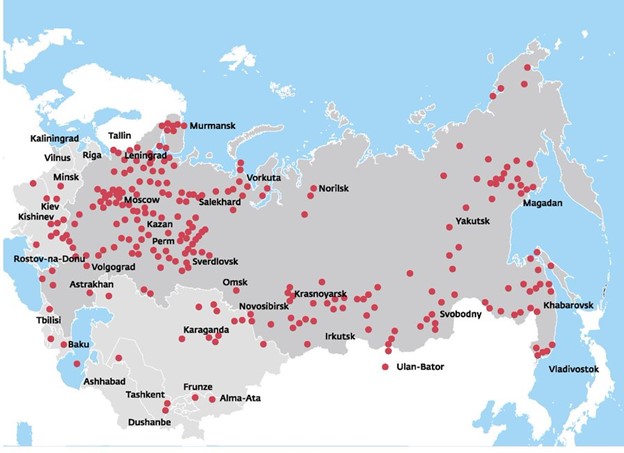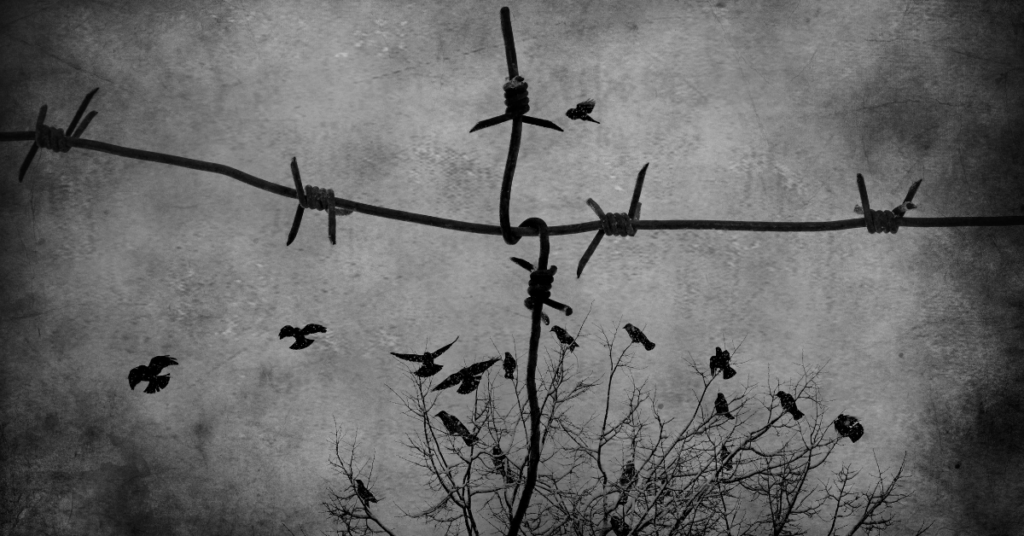The Gulag Archipelago, written in 1973 by the Russian Aleksandr Solzhenitsyn, gives a firsthand account of the Soviet Union’s prison system that began under the rule of Lenin and expanded under the harsh dictatorship of Stalin. Solzhenitsyn experienced this brutality in 1945 when he was arrested for making derogatory remarks about Stalin in letters he sent to a friend while fighting in WWII for the Soviet Red Army. After spending nearly ten years in the Gulag prison system, Solzhenitsyn wanted to reveal to the rest of the world the true horrors of the Soviet Union under its communist regime.
As the Soviet Union began its transformation into a communist country following the Bolshevik Revolution in 1917, the government began confiscating private property. The government formed “collectives,” where farms would no longer be owned by the farmers themselves but would be owned by the government. Since many of these poor farmers did not want to give up their land, their homes, or their produce, the government began taking from them by force. Many of these kulaks, as these farmers or landowners were called, were forced off their land into the harsh Russian wilderness. Solzhenitsyn described in his book one occasion where 10,000 families were driven from their homes during the Russian winter. He wrote, “No food or tools were left for them. Roads were impassable, and there was no way through to the world outside, except for two brushwood paths…Machine-gunners manned barriers on both paths and let no one through from the death camp. They started dying like flies. Desperate people came out to the barriers begging to be let through, and were shot on the spot…They died off – everyone one of them.” Millions of civilians lost their lives in this process.
However, not everyone was just driven off their land, forced to become homeless, and robbed of all their belongings. Many were executed by firing squad. Others were arrested and thrown into the Gulag prison system. In the title of his book, Solzhenitsyn compares the Gulag prison system to a chain of islands, an archipelago, because the prison camps were scattered all across the Soviet Union. It seemed there were more Gulags than cities.

These forced labor camps were first instituted in 1919. They originally functioned as a prison for private-property owners who refused to give up their belongings to the government, but later it included political prisoners as part of Stalin’s “purge.” Stalin decided to “purge” the Soviet Union of anyone who stood in his way of his communist dictatorship and the utopian communist society. He arrested anyone speaking out against communism, his government, or him personally. As part of the purge, Stalin founded a secret police force to arrest people without trial and force them into these labor camps. Everyone was susceptible to arrest – ordinary criminals, civilians, rebellious intellectuals, soldiers, military officers, and even Communist Party members. All were victims of Stalin’s purges and subjected to the Gulag prison system. By 1936, the Gulags held 5,000,000 prisoners. That number would only increase every year until Stalin’s death in 1953. According to Solzhenitsyn, between 1928 and 1953 “some forty to fifty million people served long sentences in the Archipelago.” The official total from the Soviet government states that 10 million people were in these camps from 1934 to 1947, but the true number is probably much higher than that.
The Gulags functioned as a forced labor system. Prisoners were used to chop down trees, build railroads, dig canals, or work in mines. The prisoners were largely starved while they were there and threatened with execution if they refused to work. Many were shot trying to escape. The combination of the harsh climate, long hours of labor, inadequate food, and executions led to the deaths of tens of thousands of people each year. Western scholars estimate that anywhere from 1.2 million to 1.7 million people died in the Gulags from 1918 to 1956. The actual number is probably much higher because oftentimes, once a prisoner was near death, he or she would be released to technically die “outside” of the Gulag prison, even though the cause of death was the Gulag.
The atrocities committed by the Soviet Union on its own people during this time have been unnoticed by many, as they were overshadowed by the events of WWII and the Holocaust perpetrated by Hitler. Hitler’s Nazi regime murdered 6 million Jews and 5 million non-Jews during his effort to purge society of certain people.
Leaders like Hitler and Stalin responsible for such brutality and destruction are classified as evil, and rightly so. However, their evil crimes against humanity could not take place without thousands of others carrying out these heinous acts. The Gulag prison system couldn’t work without guards willing to starve and execute their own countrymen. The Holocaust couldn’t happen without soldiers willing to starve and execute their neighbors. How do you get so many thousands of people to go along with such evil? How were these two men able to implement such horrific things on such a large scale?
For all of this to take place, there must be people who go along with it. But how can people knowingly participate in something so evil? Hitler and Stalin both needed ordinary people who would not consider themselves evil to act in evil ways, all while not thinking it is evil. The shop owner who denies service to the Jew, the neighbor who tells the SS where Jews are hiding, the guard who loads them on the train, the soldier who strips them of their clothing and belongings, the soldier who escorts them into the gas chamber, all of them are complicit in Hitler’s reign of terror. As CP Snow stated, “When you think of the long and gloomy history of man, you will find more hideous crimes have been committed in the name of obedience than have ever been committed in the name of rebellion.”
Why? Solzhenitsyn noted in his book that they all adhered to ideology that gave them justification for what they were doing. The people had to believe that they were acting for the “greater good.” They had to be convinced that there was no other way to a perfect society than by eliminating those who are standing in the way. Soviets must turn over kulaks to the secret police. Germans must turn over Jews to the Nazis. Family members must betray family members if they are standing in the way of Stalin’s communist society or Hitler’s Great Solution. When those individuals believe they are doing these things for the “greater good,” then fail to see their own actions as the evil that they are. Private property owners were the enemy because they were the stumbling block to the communist utopia. Therefore they deserve to be arrested and forced out of their homes. Jews were a stumbling block to the perfect society, therefore, they deserved to be exterminated. It was the idea that the purge of people was necessary that allowed men to justify their deeds. If only they had followed Henry David Thoreau’s advice, “If the machine of government is of such a nature that it requires you to be the agent of injustice to another, then, I say, break the law.”
In other words, ideas matter. Solzhenitsyn stated, “Ideology – that is what gives evil doing its long-sought justification and gives the evildoer the necessary steadfastness and determination. That is the social theory which helps to make his acts seem good instead of bad in his own and others’ eyes, that he won’t hear reproaches and curses but will receive praise and honors…Thanks to ideology, the 20th century was fated to experience evildoing on a scale calculated in the millions. This cannot be denied, nor passed over, nor suppressed.” The beliefs held by these dictators mattered to the fates of millions of individuals. And the beliefs held by the populations of these countries mattered to those same millions. Ideas have consequences. The idea that evil acts are justified for the “greater good” of a society affected millions and millions of lives throughout the 20th century. But that wasn’t unique to just that time and place. This has happened throughout history – and even in our society today.
The evil done by ordinary people is also a shocking look at the true condition of the human heart. None of those soldiers and guards believed that they were evil people, yet evil was resting in their hearts only to be released with some justification. Solzhenitsyn made this same observation in his book. He wrote, “Gradually it was disclosed to me that the line separating good and evil passes not through states, not between classes, not between political parties either – but right through every human heart – and through all human hearts.”
It isn’t the evil that is out there in the world waiting to get us. It is the very evil that lies within our own hearts. This is the reality of the human condition. And interestingly, most of the ideology offered by the world denies this reality. Other religions – including secularism – point to the good within each of us. People want to believe that man is basically good. We may have a few flaws but all we need is some self-help, self-love, and self-improvement. When we view ourselves this way, then we have no need for a savior. We just have to improve ourselves a little.
God describes our condition differently. Jeremiah 17:9 states, “The heart is deceitful above all things and desperately wicked. Who can know it?” The true condition of our hearts is not that we need to improve a little; it’s that we are dead and need to be made alive — something we could never do in our own power. We can’t erase that evil and depraved state by trying to just follow more rules and doing more self-love. We must rely on someone else to fix this condition of the heart. But to whom can we turn if we all have this problem? Thankfully, Paul tells us in Ephesians 2:4-5, “But because of His great love for us, God, who is rich in mercy, made us alive with Christ even when we were dead in transgressions — it is by grace you have been saved.” When we see ourselves truthfully, we recognize our need for a savior, our dependence on God, and our need to repent.





1 thought on “Is Man Basically Good?”
Wow!!!
Comments are closed.